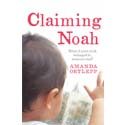 IN BRIEF:
IN BRIEF:
A compelling debut novel from Amanda Ortlepp that canvases the ethical complexities of embryo donation but delves deeply into the question of what it means to be a mother.
Details, Details
Published by Simon & Schuster Australia, March 2015
Format: paperback (384pp) and e-book
ISBN 9781925030600
ISBN 9781925030624
List Price: AU$ 29.99 (paperback) AU$9.99 (e-book)
Thoughts:
I remember the sense of violation I felt when my wallet was stolen from my pram.
My daughter was 6 months old. We were shopping in the supermarket and, as I often did, I put the wallet in the top of the pram.
At the check-out it was gone. I was certainly angry about the inconvenience of lost credit cards, driver’s license etc. But more than that, I was scared that a robber’s hands had been so close to my baby girl.
The invisible protective shield that I thought existed around my pram was gone.
Imagine if it was not the wallet that had been taken, but the baby herself? What sense of devastation then?
The idea is virtually unthinkable, yet it is precisely the situation Amanda Ortlepp confronts in her engrossing debut novel Claiming Noah.
To say that Sydney couple, Catriona and James, experience a rocky path to parenthood is perhaps an understatement.
First, there is Catriona’s reluctance to relinquish her career and lifestyle. Then, when she does come around to the idea, Catriona must suffer the highs and lows of IVF treatments to overcome the couple’s shared infertility issues. Once Catriona does fall pregnant, the couple decides to anonymously donate their final remaining embryo to another infertile couple. But when baby Sebastian is born, Catriona finds new motherhood is nothing like she thought it would be.
‘As she glanced at the baby on her chest, tiny and helpless but already grappling for her with its mouth and its one free hand, she waited for the rush of adoration she knew she was supposed to feel. Instead she feel dread taking hold of her like a hand to her throat.’
When fellow Sydney couple, Diana and Liam, receive a donated embryo, they cannot believe their good fortune. Despite the lack of shared genes, the couple develops an instant bond with their son, Noah; he is the light of their lives. But at two months of age, the dream turns to nightmare when their baby boy is abducted from right under Diana’s nose in a supermarket.
You can probably hazard a guess as to how the two narratives – that of Catriona, and Diana – end up coming together. But this won’t make Claiming Noah any less intriguing.
There is something compelling about this book, which is narrated from the points of view of the two mothers involved.
Both women are flawed, and display huge errors of judgement – particularly as they relate to their choice in men. In fact, nearly every main character in this book has major personality flaws, but the women at least experience personal growth; we cannot help but feel for them.
Ortlepp writes with touching emotional accuracy about the bond between mother and child, and this is ultimately the question the book poses – what is it that makes a mother?
The ethics of embryo donation will provide interesting fodder for book club discussions but the question of whether a mother is defined by her genetic connection to a child, or her love for it, is perhaps a more interesting one.
While Claiming Noah is written as a piece of realist fiction, some of the contrivances do stretch the bounds of credibility. But I am willing to forgive this because the book made me do something I don’t ordinarily do in book – and that’s – to cry. And isn’t that, after all, what reading is all about – to feel something, deeply?
 About the author:
About the author:
Amanda Ortlepp is a marketing and communications professional who lives in Sydney. She has been signed by Simon & Schuster Australia in a two-book deal. Claiming Noah is her first novel.
To read an extract from Claiming Noah, visit Simon & Schuster Australia.
*Review copy supplied by the publisher
